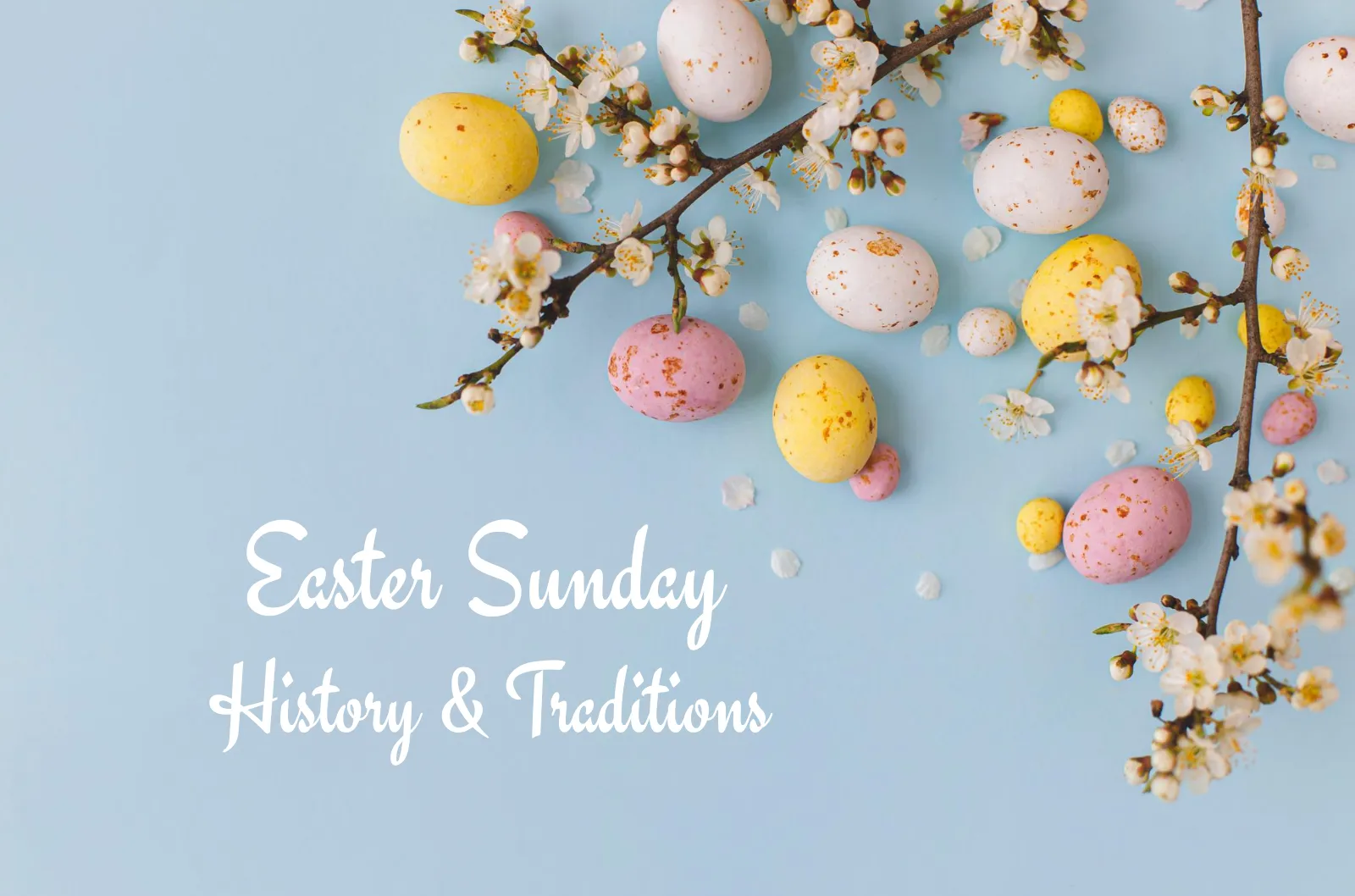- Friend
- Family
- New Year
- Celebrations
- Celebrations
Easter Sunday: History And Traditions Around The World
by Note with Love Team - Apr 16, 2025
Easter is one of the most widely celebrated festivals around the world. Unlike Christmas, Easter Sunday is not celebrated on the same date every year. You must be wondering why does the date of Easter change every year? Well, continue reading as I am going right into it after talking a little about the origin of the festival.
I will also talk about some traditions that have become synonymous with Easter Sunday celebrations. Different countries celebrate the day with different traditions. One thing, common all over the world, is sharing happiness on this holy day with your loved ones. Even if you are not celebrating the day together, you can always send some beautiful greetings. Here are some inspirations for you.
What Is Easter Sunday?
Easter Sunday, which honors Jesus Christ’s ascension from the dead, is one of the most significant occasions on the Christian calendar. The festival is observed on the first Sunday following the first full moon following the spring equinox, typically between March 22 and April 25.
When Is Easter In 2025?
According to the Gregorian calendar, Easter Sunday will fall on April 20th in 2025. And this year, something rare will happen! Orthodox Easter will fall on the same day as Catholic Easter this year—April 20.
Origin Of Easter
Easter Sunday’s history can be traced back to the biblically described events following Jesus Christ’s death and resurrection.
Easter marks the end of Lent, which is basically a 46 days observance that starts with Ash Wednesday. In this period, Christians observe fast, restrict themselves from eating meat, fish, eggs, and fats, give up some item, do charity, and refocus on studying religion. Lent ends with the Holy week, which begins with Palm Sunday. You can find more on 40 Acts.
From Palm Sunday to Good Friday to Easter, here is a timeline of events:
Palm Sunday: It is the first day of the Holy week. This day celebrates Jesus’ triumphant arrival in Jerusalem. It is believed that people welcomed Christ with palm branches. Thus this day of the feast is called Palm Sunday. It will be on April 13 in 2025.
Holy/Good Wednesday: Also known as the Spy Wednesday, this day commemorates Judas betraying Jesus. Good Wednesday is on Apr 16, 2025.
Maundy Thursday: This is the day that marks the observance of maundy (washing of the feet) and last supper of Jesus with the chosen disciples. This year Maundy Thursday falls on April 17, 2025.
Good Friday: This day remembers Jesus Christ’s crucifixion. As recorded in the New Testament, Jesus was taken into custody, tried, and given the death penalty. He later died on the cross after being crucified. April 18, 2025, will be celebrated as Good Friday this year.
Holy Saturday: His followers observed Saturday’s Sabbath, also referred to as the Easter Vigil. It was the day of mourning, in memory of Jesus. In 2025, it will be on April 19.
Easter Sunday: On Sunday, Jesus rose from the dead, and the tomb he was laid in was found to be empty. Easter Sunday will be observed on April 20, 2025, as mentioned above.
Although the date of first Easter is unknown, it is thought to have taken place around the springtime Jewish holiday, Passover. Until the 4th century, Easter was held on the same day as Passover. The church, however, started using a new formula to determine the date of Easter, which brings us to the answer of why Easter’s date change every year.
Why Easter date is different every year?
The spring equinox and the lunar cycle led to the decision that Easter would fall on the first Sunday after the first full moon following the equinox, which is typically on or around March 21. The calculation used to determine Easter’s date is based on both astronomical and ecclesiastical factors, so it changes from year to year.
However, the formulas used to determine the full moon and the spring equinox are a mix of astronomical calculations and church customs. Because of these variables, Easter can occur on any date between March 22 and April 25, with March 22 being the earliest possible date. Since the sixteenth century, this system has been in use, and all Christian denominations widely regard it.
Who celebrates Easter?
Easter is a Christian holiday that is primarily observed by Catholics, Orthodox, and Protestants all over the world.
Many Christian-majority countries, including the United States, Canada, the United Kingdom, Australia, and many European nations, observe Easter as a public holiday. But even non-religious people observe it as a secular and cultural holiday in many nations.
In Europe, Easter Monday, the second day of Easter, is also recognized as a public holiday. Parades, festivals, and other cultural events are held to mark the occasion. It has become a family day for celebrating there.
How The US Celebrates Easter
Attending Church services: Easter Sunday is a popular day for church attendance in America. Many churches hold special services to celebrate the resurrection of Jesus.
Photo by Bianca Ackermann on Unsplash
Decorating Easter eggs: Decorating Easter eggs is a well-known custom in the United States. People decorate eggs by coloring them and adding stickers, glitter, and other embellishments.
Easter egg hunts: Easter egg hunt is a fun activity for kids. Parents bury eggs stuffed with treats or tiny toys for the kids to search for them.
Photo by New York Welcome
Parades: Some towns hold Easter parades with floats, music, and other festivities.
Easter baskets: On Easter Sunday, a lot of families give their kids Easter baskets that are filled with chocolate bunnies, chocolate eggs, candy, cuddly items, and other goodies.
Photo by Isabella Fischer on Unsplash
Easter meals: Families get together for a special meal that typically consists of ham.
Spring break: Because Easter occurs during spring break for many American schools, some families use the time off to travel or organize other activities.
Easter Sunday Traditions In Other Countries
The Vatican City
Thousands of attendees from all over the world gather for the Pope’s Easter Sunday Mass at St. Peter’s Basilica.
France
There are two traditions unique to France. One is Easter Bells. Church bells are not rung from Thursday till Easter Sunday of the Holy week in respect of Christ. According to legend, the church bells fly to Rome to get blessed by the Pope and on their way back, these bells pick up Easter eggs and then scatter the eggs in the garden. Another tradition comes from the town of Bessières, in the South of France. They make giant omelet on the following Monday, using 15,000 eggs. The whole town then shares it.
Greece
Greeks most often attend church services during the Holy Week of Easter, also known as “Pascha”. Immediately following services at church, families assemble to share a traditional Easter feast of roasted lamb, red-dyed eggs, and sweetbread.
United Kingdom
They celebrate the Tuesday before Ash Wednesday with great festivities, which is known as Pancake day. Easter Monday is also widely celebrated with family in the UK.
Brazil
They celebrate combining Christian and pagan legacy. Brazilians attend Mass on Easter Sunday, which is also connected to the “Festa de So Joo,” a celebration of music, dancing, and vibrant parades.
Sweden
Swedes children disguised as witches visit houses, door to door and barter drawings or paintings for candy and sweets. Pickled herring, cured salmon, and meatballs are just a few of the traditional Easter foods that Swedes enjoy.
Mexico
During Holy Week, most Mexicans attend church services and enjoy Easter dishes such as bacalao (salted cod) and capirotada (sweet bread pudding).
The Philippines
Christian men and women arrange to separate vigils. While the men carry a photo of Christ the women carry photo of Mary. Then the two processions meet at the church where religious service is held.
Easter Trivia
- The term “Easter” is derived from “Ēastre”, a pagan spring festival.
- The largest Easter egg, 9.8 meters tall and weighing 2,259 kg, was built in 1975 in Vegreville, Alberta, Canada.
- In the 17th century, Germany was the first to celebrate Easter by giving baskets stuffed with treats and toys.
- During Easter, Greeks play “Tsougrisma” in which two people each hold and tap a red egg together to see whose egg breaks first.
- Every Easter Monday, the White House lawn hosts the Easter egg roll, a custom that dates back to 1878.
- Because Bilby is a native and endangered animal in Australia, it is customary to have an Easter Bilby instead of a bunny.
- As a part of a fertility ritual, dousing women with water on Easter Monday is a common practice in many European nations, including Hungary and Poland. It’s a known fertility ritual.
Bottom Line
There are many other traditions and festivals observed in different parts of the world on Easter. But the Easter egg hunt is a common tradition everywhere. Although it came as a hunt for the kids, adult Easter egg hunt parties are very common these days. If you are looking for some ideas to host such a party, here are some fun Easter egg hunt ideas for adults!
FAQ
What Is The Story Behind Easter Bunny?
Photo by Sarah Takforyan on Unsplash
The Easter Bunny is a beloved Easter icon, especially in North America and some European nations. The myth is that Easter Bunny visits homes and hides colored eggs for kids to find. Although the Easter Bunny’s history is obscure, it is thought that he first appeared as a folkloric figure in medieval Europe, when rabbits and hares were symbolic of springtime and fertility.
In the 18th century, German immigrants brought the custom of the “Osterhase,” or Easter Hare in the US, which is now known as the Easter Hare. Having chocolate bunnies in an Easter basket is a common sight.
By the way, the Easter bunny’s real name is Peter Cottontail.
What Do Easter Eggs Mean?
Easter eggs, the most common Easter symbol, represent fertility and rebirth. The Easter egg itself is a symbol for Christians for both the tomb from which Jesus was raised from the dead and the new life that spring brings. To celebrate Easter, some people paint eggs with pastel colors or patterns.
How Did The Tradition Of Easter Lilies Start In The US?
Easter lilies are native to Japan and were first brought to the United States in the early 20th century. They are famous for their large trumpet-shaped blooms and sweet fragrance. Besides being used as Easter decorations and gifts, they are frequently used in Christian churches as a symbol of chastity, hope, and a fresh start.
Trending in Notes
If I had a dollar for every time you’ve made my life better, I’d be the richest person in the world. Here’s to you, my love—happy birthday!
I may have taken you for granted at times, and things may have been tense or uncomfortable recently. But I do want you to know how much I value you and how happy I am to have you in my life. This Thanksgiving I am thankful that I have you.
You May Also Like


- Celebrations
- Family
- Friend
- New Year
New Year's Eve Traditions: Try For A Lucky New Year 2026

- Friend
- Family
- Thanksgiving
- Celebrations










